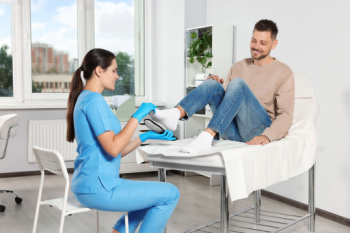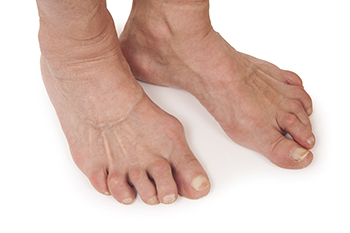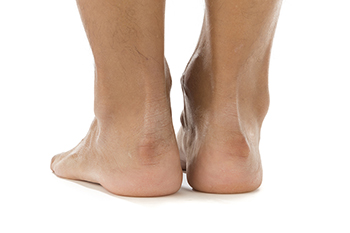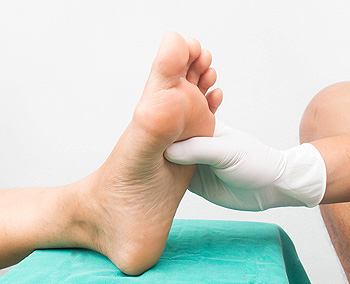
 Orthotics are devices inserted into shoes to support, align, or improve the function of the feet. They help relieve pain and prevent injuries by redistributing pressure and providing support to specific areas of the foot. This can alleviate issues such as plantar fasciitis, flat feet, and overpronation, reducing strain on muscles and joints. Although there are various types of orthotics, rigid, semi-rigid, and soft, determining which type works best for an individual's condition can be somewhat unpredictable. The effectiveness of orthotics largely depends on the specific foot problem and the unique biomechanics of the patient. For optimal results, it is suggested that if you are interested in understanding more about orthotics, you schedule an appointment with a podiatrist who can perform a thorough evaluation of your foot condition and overall health and determine if orthotics are right for you.
Orthotics are devices inserted into shoes to support, align, or improve the function of the feet. They help relieve pain and prevent injuries by redistributing pressure and providing support to specific areas of the foot. This can alleviate issues such as plantar fasciitis, flat feet, and overpronation, reducing strain on muscles and joints. Although there are various types of orthotics, rigid, semi-rigid, and soft, determining which type works best for an individual's condition can be somewhat unpredictable. The effectiveness of orthotics largely depends on the specific foot problem and the unique biomechanics of the patient. For optimal results, it is suggested that if you are interested in understanding more about orthotics, you schedule an appointment with a podiatrist who can perform a thorough evaluation of your foot condition and overall health and determine if orthotics are right for you.
If you are having discomfort in your feet and would like to try orthotics, contact Dr. Harris L. Klear from Burlington County Podiatry Associates. Our doctor can provide the care you need to keep you pain-free and on your feet.
What Are Orthotics?
Orthotics are inserts you can place into your shoes to help with a variety of foot problems such as flat feet or foot pain. Orthotics provide relief and comfort for minor foot and heel pain but can’t correct serious biomechanical problems in your feet.
Over-the-Counter Inserts
Orthotics come in a wide variety of over-the-counter inserts that are used to treat foot pain, heel pain, and minor problems. For example, arch supports can be inserted into your shoes to help correct overarched or flat feet, while gel insoles are often used because they provide comfort and relief from foot and heel pain by alleviating pressure.
Prescription Orthotics
If over-the-counter inserts don’t work for you or if you have a more severe foot concern, it is possible to have your podiatrist prescribe custom orthotics. These high-quality inserts are designed to treat problems such as abnormal motion, plantar fasciitis, and severe forms of heel pain. They can even be used to help patients suffering from diabetes by treating foot ulcers and painful calluses and are usually molded to your feet individually, which allows them to provide full support and comfort.
If you are experiencing minor to severe foot or heel pain, it’s recommended to speak with your podiatrist about the possibilities of using orthotics. A podiatrist can determine which type of orthotic is right for you and allow you to take the first steps towards being pain-free.
If you have any questions please contact one of our offices located in Marlton and Delran, NJ . We offer the newest diagnostic and treatment technologies for all your foot and ankle needs.

Rheumatoid arthritis, or RA, can wreak havoc on the feet, causing a myriad of symptoms and affecting various joints. One of the most telling signs of RA in the feet is the presence of pain, swelling, and stiffness, particularly in the morning or after periods of rest. RA commonly targets the joints in the feet, including the metatarsophalangeal, or MTP joints, the interphalangeal, or IP joints, the subtalar joint, and the ankle joint. Inflammation in these joints can lead to deformities like bunions, hammertoes, and ankle instability. Additionally, RA can cause joint erosion and destruction over time, resulting in significant disability and loss of function. Early diagnosis and intervention is essential in managing RA in the feet, as prompt treatment can help alleviate symptoms and preserve joint function. If you have foot pain, it is suggested that you consult a podiatrist who can diagnose RA and help you to manage this condition.
Because RA affects more than just your joints, including the joints in your feet and ankles, it is important to seek early diagnosis from your podiatrist if you feel like the pain in your feet might be caused by RA. For more information, contact Dr. Harris L. Klear of Burlington County Podiatry Associates. Our doctor will assist you with all of your podiatric concerns.
What Is Rheumatoid Arthritis?
Rheumatoid Arthritis (RA) is an autoimmune disorder in which the body’s own immune system attacks the membranes surrounding the joints. Inflammation of the lining and eventually the destruction of the joint’s cartilage and bone occur, causing severe pain and immobility.
Rheumatoid Arthritis of the Feet
Although RA usually attacks multiple bones and joints throughout the entire body, almost 90 percent of cases result in pain in the foot or ankle area.
Symptoms
Diagnosis
Quick diagnosis of RA in the feet is important so that the podiatrist can treat the area effectively. Your doctor will ask you about your medical history, occupation, and lifestyle to determine the origin of the condition. Rheumatoid Factor tests help to determine if someone is affected by the disease.
If you have any questions please feel free to contact one of our offices located in Marlton and Delran, NJ . We offer the newest diagnostic and treatment technologies for all your foot and ankle needs.

Haglund's deformity, commonly known as pump bump, is a bony enlargement that forms where the Achilles tendon attaches to the back of the heel bone. This painful condition often results from repetitive friction caused by wearing stiff or poorly fitting shoes, such as high heels or rigid-backed footwear. The constant rubbing leads to inflammation, redness, swelling, and the formation of calluses around the affected area. Those with abnormal foot mechanics, such as foot supination or high arches, are at higher risk of Haglund’s deformity. Symptoms include a visible bony bump, pain at the back of the heel, and swelling, particularly when wearing tight shoes. Conservative treatment includes reducing pressure and friction through wearing better-fitting footwear, heel pads, and certain exercises to alleviate pain and inflammation. In severe cases, surgery may be necessary to remove the bony protrusion and restore normal function. If you are experiencing persistent heel pain or suspect you have Haglund's deformity, it is suggested that you schedule an appointment with a podiatrist for an exam, a diagnosis and suggestions for treatment.
Many people suffer from bouts of heel pain. For more information, contact Dr. Harris L. Klear of Burlington County Podiatry Associates. Our doctor can provide the care you need to keep you pain-free and on your feet.
Causes of Heel Pain
Heel pain is often associated with plantar fasciitis. The plantar fascia is a band of tissues that extends along the bottom of the foot. A rip or tear in this ligament can cause inflammation of the tissue.
Achilles tendonitis is another cause of heel pain. Inflammation of the Achilles tendon will cause pain from fractures and muscle tearing. Lack of flexibility is also another symptom.
Heel spurs are another cause of pain. When the tissues of the plantar fascia undergo a great deal of stress, it can lead to ligament separation from the heel bone, causing heel spurs.
Why Might Heel Pain Occur?
Treatments
Heel pain should be treated as soon as possible for immediate results. Keeping your feet in a stress-free environment will help. If you suffer from Achilles tendonitis or plantar fasciitis, applying ice will reduce the swelling. Stretching before an exercise like running will help the muscles. Using all these tips will help make heel pain a condition of the past.
If you have any questions please contact one of our offices located in Marlton and Delran, NJ . We offer the newest diagnostic and treatment technologies for all your foot and ankle needs.
 Charcot foot affects the bones, joints, and soft tissues of the foot and ankle. It occurs most commonly in individuals with peripheral neuropathy, particularly those with diabetes. The disease is characterized by the weakening of the bones in the foot, which can fracture easily, leading to deformities. In Charcot foot, the bones weaken and can break with minimal or no apparent trauma. As the condition progresses, the foot can become misshapen and unstable, often resulting in a rocker-bottom deformity. This can severely impair walking and lead to complications if not treated promptly. Symptoms of Charcot foot include swelling, redness, warmth in the affected area, and sometimes pain, though this may be diminished due to neuropathy. The foot may appear deformed, and patients might notice that their shoes no longer fit properly. Diagnosis of Charcot foot generally involves a thorough medical history review, physical examination, and imaging studies such as X-rays or MRI scans to assess bone damage and changes in foot structure. Treatment focuses on stabilizing the foot and preventing further damage. If you suspect you have Charcot foot or are experiencing symptoms, it is suggested that you visit a podiatrist promptly for a comprehensive evaluation and appropriate treatment solutions.
Charcot foot affects the bones, joints, and soft tissues of the foot and ankle. It occurs most commonly in individuals with peripheral neuropathy, particularly those with diabetes. The disease is characterized by the weakening of the bones in the foot, which can fracture easily, leading to deformities. In Charcot foot, the bones weaken and can break with minimal or no apparent trauma. As the condition progresses, the foot can become misshapen and unstable, often resulting in a rocker-bottom deformity. This can severely impair walking and lead to complications if not treated promptly. Symptoms of Charcot foot include swelling, redness, warmth in the affected area, and sometimes pain, though this may be diminished due to neuropathy. The foot may appear deformed, and patients might notice that their shoes no longer fit properly. Diagnosis of Charcot foot generally involves a thorough medical history review, physical examination, and imaging studies such as X-rays or MRI scans to assess bone damage and changes in foot structure. Treatment focuses on stabilizing the foot and preventing further damage. If you suspect you have Charcot foot or are experiencing symptoms, it is suggested that you visit a podiatrist promptly for a comprehensive evaluation and appropriate treatment solutions.
Some foot conditions may require additional professional care. If you have any concerns, contact Dr. Harris L. Klear of Burlington County Podiatry Associates. Our doctor can provide the care you need to keep you pain-free and on your feet.
Rare Foot Conditions
The majority of foot conditions are common and can be treated by a podiatrist. Standard diagnostic procedures are generally used to identify specific conditions and treatment can be rendered. A podiatrist also treats rare foot conditions which can be difficult to diagnose and may need extra attention and care.
There are many rare foot conditions that can affect children. Some of these can include:
Freiberg’s disease - This can be seen as a deterioration and flattening of a metatarsal bone that exists in the ball of the foot. It typically affects pre-teen and teenage girls, but can affect anyone at any age. Symptoms that can accompany this can be swelling, stiffness, and the patient may limp.
Kohler’s disease - This often targets the bone in the arch of the foot and affects younger boys. It can lead to an interruption of the blood supply which ultimately can lead to bone deterioration. The patient may limp or experience tenderness, swelling, and redness.
Maffucci syndrome - This affects the long bones in a child’s foot leading to the development of abnormal bone lesions. They are benign growths and typically develop in early childhood and the bones may be susceptible to breaking.
A podiatrist can properly diagnose and treat all types of rare foot conditions. If your child is affected by any of these symptoms or conditions, please don’t hesitate to call our office so the correct treatment method can begin.
If you have any questions please feel free to contact one of our offices located in Marlton and Delran, NJ . We offer the newest diagnostic tools and technology to treat your foot and ankle needs.